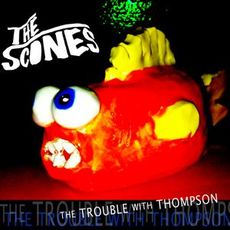
I N T E R V I E W
The Perfect Things to Have with your Devonshire Tea Julian White of The Scones By Ian Duggan On 9 April we get the treat of ‘The Scones’ playing at Nivara Lounge, hot on the heels of the release of their debut EP ‘The Trouble with Thompson’ on 28 March. We talked to guitarist and vocalist Julian White ahead of the gig about their sound, influences, history, and the ever-contentious pronunciation of ‘scones’. HUP: You have released a few songs on Soundcloud prior to the new EP, which were tied together under the moniker ‘Go Ahead, Bake my Day’, and there appears to be a definite '80 and '90s Flying Nun vibe in there. Who do you consider to be the main influences in your music? Julian: My musical awakening came at the beginning of 1980, when I was starting 4th form. I went from listening to Earth, Wind and Fire and ELO to early British punk and post-punk. Some of that punk influence can still be heard in parts of some Scones tunes. However, I think you are right in suggesting Flying Nun has had a big influence on the songs. Throughout most of the ‘80s and the first half of the ‘90s I listened to a lot of Flying Nun music, and was a fan of many of the bands. I would say that without a doubt the songwriter who had the most influence on my own song-writing was Robert Scott, particularly in the early years of The Bats and also his much earlier band Electric Blood (which he fronted prior to joining The Clean). By and large those were catchy pop songs consisting of basic chord structures and naïve lyrics, with the trebly jangle in the guitars characteristic of the Dunedin Sound. I love that sound and there is a lot of it in The Scones music. Also in the ‘90s I listened to a lot of Jonathan Richman. While that influence may not come through as strongly in The Scones’ music, it reinforced my love of a poppy sound and a quirky, almost cute lyric, which make up a large part of his songs. Many of his other lyrics are profoundly honest, heartfelt ones which I think take a certain bravery to convey, and in more recent years I have tried to add a little of that feel to some of my own song-writing. The final major influence on my song-writing I would mention is The Lucksmiths. They were a long-time Melbourne band who split a few years ago. I first heard them on an online radio station in 2007, when I was living in London, Canada. My ear was caught by the very strong antipodean accent, which was quite a foreign sound in London. What I particularly love about their music is the lyrical sophistication within what is still a pop song, with clever use of rhyme, uncommon words and lyrical devices such as zeugma. Whereas the lyrics in early Scones tunes are almost painfully naïve, more recently I have been spending much more time trying to develop more interesting lyrics. I also think it’s worth mentioning that I am not a very strong guitarist, so the simplicity of much of the material suits my technical abilities (or lack of them). Greg [Edwards], the main guitarist in the band, is a very good guitarist and has added a lot to the guitar sound of the band. He has been more influenced by stronger guitar riffs and more distorted sounds, from bands including the 3Ds, The Pixies and Pavement, so with the two guitars you get a clean, simple sound from me and a more grunty, musically interesting sound from Greg. Mike [Paterson] on drums has been in many previous bands. Dave [Colborn] on bass has less of a song-writing pedigree but has contributed some strong and often melodic basslines to the mix. HUP: Of the six songs on Soundcloud, two make an appearance on the new EP. My favourite track from the earlier songs, however — Blue and Green — which sounds quite like The Bats meets Goblin Mix, somehow didn’t make the cut. Is this an indication your sound is changing direction somewhat? Julian: It’s interesting that you mention Soundcloud. Prior to our first gig in October 2012, at Static Bar in Hood St, we thought we should at least have something on the internet. We had made rough recordings at our Auckland practice rooms of the songs we had practised at that time, initially with the thought that we might turn some of them into something. In fact, we had only polished three of the songs, but decided to upload six to at least give people an idea of our sound. So some of those recordings are flawed, with mistimings and in one case omitted lyrics (from a vocally challenging part of Red MG so that my voice could be conserved for the ones we’d polished). They were never intended to be a formal release. Bake My Day was a phrase we used on the poster for the gig, and in fact the graphic on Soundcloud is part of that poster. As far as the songs on the real EP go, their selection was a democratic process. The band’s own perception of the merits of each song change over time, and if we were to choose the tracks for the EP now they might be different. But we are happy with the songs we have chosen. The basics of each of those songs were written before the band formed in 2011. Blue and Green is also in that category. I expect you will find it on our next release, whenever that will be, along with some newer songs. In terms of the band changing direction, as mentioned in the answer to the previous question there has been some change in the song-writing process and some of the content. In some of the newer songs we have tried to vary the song structures, but I don’t think there’s a major change in the overall aesthetic. We haven’t played enough to know what the real crowd favourites are, but a few different songs have been nominated by different people. Blue and Green is one of those. And don’t worry, it still appears in our set lists and you can expect to hear it live on April 9.
HUP: Tell me a little about the history of ‘The Scones’. When did you form and where did you meet the other members? Julian: Greg and I go way back. We went to intermediate and high school together on Auckland’s North Shore. Incidentally, you mentioned Goblin Mix, who were contemporaries of ours at Northcote College. Greg and I have shared many musical adventures over the years, including a high school band called Limited Western Art and another in our first years at University in Auckland called Yorkie the Bricklayer. Neither band did anything notable, but a few of The Scones’ songs date from Yorkie days. Yorkie folded when I left Auckland in the late 1980s. For the next 20 years I moved approximately every 2 years, living in various places in New Zealand, the UK and Canada. When I finally settled back in NZ (in Hamilton) at the end of 2007 Greg was living in Germany, but when he returned in 2008 he recalled the old songs and suggested we try to revive them. We put some very rough recordings together and advertised for a drummer and bass player. Mike answered the ad, and we got together with him for a practice. That was in 2011. Nothing moves quickly with The Scones. Mike had a bass player friend who he had played with before, and who came to that initial practice, but who wasn’t able to commit to the band. So for the next few years the three of us practised when we could, and gradually polished a repertoire. We didn’t have a bass player at that time, so the bass tracks were programmed by Greg into a silver metal box. The silver metal box kept perfect time and never played a wrong note, but had no personality whatsoever. During that time Greg started playing in another band, The Imports. The bass player for The Imports was Dave, and after a while we asked if he would like to join The Scones, and happily he did, in early 2014. Dave has a great personality and is pretty much as accurate as and much more flexible than that silver metal box. We have been a 4 piece since then. We have only played live once since Dave joined the band, but recorded the EP early in 2015 and hope to play more often in 2016 and beyond. 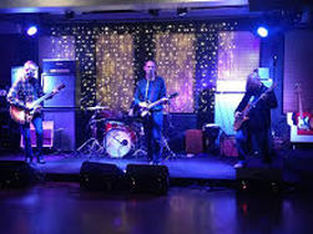
HUP: For many people, the correct pronunciation of ‘scones’ is a major point of contention. So, do you consider yourself to be ‘The Scones’ like ‘cones’, or ‘The Scones’ to rhyme with ‘cons’? And how did this name come about?
Julian: It definitely rhymes with cons. To me the alternative pronunciation is an English pronunciation. When we first started practising together, one of the songs was called Scones. We were throwing around possible names, and our drummer Mike suggested The Scones. I felt this was appropriate. The song uses scones as a metaphor for human character, and there is a line in the song which says that “everyone’s a scone”. So I think it fits. I also feel it fits with the character of at least our earlier songs, which are pretty simple in terms of chord structure and lyrical content, and it’s a simple name. I have since found out that Mike was once in a band called “The Curries”, and another one called “Love Cake”, so maybe he has a thing for food-related band names.
1 Comment
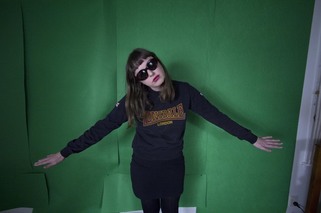 I N T E R V I E W Emily Littler of Street Chant By Arpie Shirehorse (Photo by Anna Littler) HUP caught up with Emily Littler of Street Chant ahead of the band’s show at Nivara Lounge this coming Thursday, March 31st. You’re coming to Hamilton! Have you played here before? How was it? Back when I was in Wilberforces we played a few times, since Thom (Burton) is from there. A 21st, some other shows.. One that sticks out is when Street Chant played there a few years ago, the show was great but after when we were putting gear back in the car we saw a guy stealing a pie from a dairy and the dairy owner chased after him with a cricket bat, so the guy threw the hot pie and mince went all over the dairy owners face. You guys go hard there eh. One of my favourite tracks from first album ‘Means’ is ‘Less Chat, More Sewing.’ Can we expect that and anything else off the first album at the upcoming show? Yeah we are doing heaps of the old stuff! Not sure about that one though, that song is mean so I hate doing it. What’s behind the name of the new album ‘Hauora’? Is it a slant at the state of the country’s wellbeing or more personal than that? Both and that the album is about a house. Hauora represents the 4 walls of the whare - mental, physical, spiritual and social health. What are the main differences between how you wrote/recorded ‘Means’ and ‘Hauora’? Means was done totally live, Hauora some was live but even then I would go into pro tools and drag the tracks around to change the structure of the song. I wrote more on a computer for this album, Means was more traditional band in a garage kind of. Some of these songs on Hauora haven’t even been performed live yet. I really dig ‘Swanning’ btw which didn’t make it onto the LP. Did you have any more gems that didn’t make the final cut? How do you guys make such tricky decisions – is democracy alive and well in Street Chant?! There’s one or two more that didn’t make it. Swanning didn’t make it because it didn’t fit thematically with the rest of the record. We normally agree on things. If we don’t it’s just a matter of who is more stubborn. The only time I’ve seen you was as Mean Street at Camp A Low Hum in 2008. It was pretty fantastic, I think you’d only got together a few months before. What has been your favourite Street Chant show to date? Honestly I don’t know…any house party probably. There’s been too many and my memory is crap, ha.
And any that totally sucked? Any show at a “music industry showcase.” Can we expect any hot merch at the Hamilton show?! If by “hot” you mean stolen, then yes. (HUP has it on good authority that there might well be vinyl and tees) Some quickfire questions to end…Auckland or Wellington? Hamilton. Courtney Love or Courtney Barnett? Kurt Cobabes I Courtney Love you. Kim Deal or Kim Gordon? Kimmy Elizabeth Swanson (of Auckland band Blue Bloods). Vinyl or cassette? Vinyl not that I can ever afford to buy any. You could have three NZ bands, past or present, play a show anywhere in the world. Who would it be and where? Skeptics, Blue Bloods, About Town - Live in Ibiza. I N T E R V I E W Wairehu Grant and Macaila Pescud from The Goth and the Pixie by Ian Duggan (Photos by Ngamihi Pawa) ‘The Goth and the Pixie’ were formed in 2014 by guitarist Wairehu Grant (a.k.a. ‘The Goth’) and violinist Macaila Pescud (a.k.a. ‘The Pixie). With the recent addition of drums and bass, the band and their sound are seemingly ever-evolving. HUP catches up with both the Pixie and the Goth to discuss the changes in their style, their future aspirations, and Macaila’s Hamilton music pedigree. HUP: The name ‘the Goth and the Pixie’ might give the wrong impression to those who haven’t seen you live or checked out your recordings, being neither goth nor sounding like the Pixies. How would you describe your sound? Pixie: First of all, when it comes to the band name, I used to be in a band with my friend Effie called “The Pixie and the Gypsy”, and Wairehu was jokingly known as ‘the Goth’ in our circle. One day at an open mic someone wrote ‘the Goth and the Pixie’ on the board as me and Wai’s duo name – and it stuck. I think it describes our music well because we have creepy, chaotic darkness and pretty moments which mingle together. That’s how I would describe our music. It’s the contrast of the two – and the contrast of us two as people with our different styles and musical backgrounds. Of course now there are four of us. I’d like the name to become about archetypes, and people who come to our gigs can dress up and be theatrical. The music too is quite playful in a lot of ways. I like to push the boundaries of convention. I think that’s my main thing about music – I don’t really think there are rules. But there are directions the music wants to go, and I like to follow that. I’ve been largely influenced by bands such as Barons of Tang, Modest Mouse and Bright Eyes and their chaotic moments. Goth: Yeah I’d really say our differing musical backgrounds have had a huge impact on our sound overall. I grew up a huge music nerd constantly getting obsessed with musicians and bands and wanting to know everything about them. Dad really got me into stuff like the Stones, Zappa, and Dylan. Then throughout High School and early University I kind of darted all over the show with my listening and playing styles: Jazz, dad rock, Pantera, The Cure, Tom Waits, anything that caught my attention really. All of that got me started on guitar for sure, and I think that all really feeds into how I approach a lot of our stuff from a guitar playing standpoint. The vast majority of our tracks are Macaila’s creations and I just do my best to interpret them musically. HUP: Your sound and line-up are evolving. You started out as an acoustic two-piece, with guitar and a violin, went electric, and you are now a four piece with drums and bass. What are your future aspirations, and what do you think you might look like a year from now? Pixie: The electric thing happened as a happy surprise for me. I wouldn’t have thought about going electric, being from a mostly acoustic background and brought up with folk/Irish music. But of course Wai, being super badass, used to play in a metal band and suggested to go electric for some of the songs – and he was right. It added a whole new dimension. Our drummer, Lott [Larsen], was originally a jazz drummer too. We’re all from very different genres and I like how that bleeds into the music. It brings new ideas and creativity. We were actually trying to find a bass brass instrument instead of a bass at first. I thought it would be super cool to have something like an oboe, just real quirky but with a loud and smooth sound. But then we jammed with Albert Bannister on bass a few times and we just had to keep him. So, future aspirations, for me; brass instruments, a song about breaking pianos, an album and I’ll learn to play musical saw. Right, that’s a year from now! Long term: to do some super theatrical tour and shows. Goth: Yeah at the early stages I wasn’t really sure where the electric thing was going to go either. It started off really simplistic with me just adapting the chords and melodies to suit the electric guitar, but it really began to take shape once I started expanding my pedal board. Now we’re working with loop pedals, modulation effects, delays and occasionally some synth and other electronic stuff. It’s been a real crash course in shoe gaze 101, but it’s helped me a lot with some of my more artsy fartsy projects at University. As far as my views of a year from now, hell yes to the brass section, a tour and EP would definitely be a must by then as well, and hoping that I can manage to juggle my post grad studies at Uni. Fingers crossed on that last one. HUP: Macaila, you are a second generation Hamilton musician, with your dad having been in '90s band Loose New Romans, among others. Has your family been a big influence in your music and taking up live performance?
Pixie: My mother was also in [‘90s Hamilton band] Nemesis, back in the day! Both my parents completed respective music degrees. And for sure, having a musical family is incredibly influential. My dad has his own home studio where he records songs he writes and, once my sister and I were older, he often recorded us singing his songs. My mother also writes her own originals and would sometimes get me to sing on stage with her at her gigs. These experiences awakened within me a deep desire to perform in my own band. I didn't think my parents had influenced my style until I heard some of my mum’s early Wintec recordings. There's a certain energy that we both capture I think. The emphasis on Irish/folk violin throughout my life has definitely influenced my playing style. HUP: Macaila, besides Goth and the Pixie, you have also been involved in the New Millennium Beatniks, providing musical backing to Richard Selinkoff's poetry. How did you get involved in that project? Pixie: Actually with NMB I saw them perform at a mutual friend's birthday party that Goth and the Pixie were also performing at, over a year ago. I really liked the feel of it. I simply went up to Richard and asked if I could perhaps have a jam or perform alongside them sometime. Richard’s response was to fluff on about how [NMB’s double bass player] Martin [Fisher] was very picky about who they played with. But then a couple of days later I received a Facebook message from him saying that Martin was uncharacteristically excited at the mention of me joining. So I guess he likes my style. Haha! The interesting thing about NMB is that it's all improvised. We usually meet the night before to hear that poems for the first time and sometimes we will jot down a feel or certain places for abrupt stops but otherwise it's down to whoever leads it on the night. I call it musical flirting - there's a certain interplay that happens when it's all fresh like that. It's incredibly invigorating and impossible to get bored of. I N T E R V I E W Justin Harris of Elider by Ian Duggan Inchworm were a popular Hamilton band in the mid- to late-1990s. While Scott Brodie (bass) and Rob Talsma (drums) headed to England, guitarist Justin Harris moved to Japan to teach English in early 2000. HUP talks to Justin in Kyoto about his musical adventures since leaving Hamilton, and in particular his solo project Elider. HUP: How would you describe the sound of Elider? If Inchworm had continued longer, do you think the Elider songs would have entered the Inchworm repertoire, or are you aiming to do something quite different?
Justin: When Inchworm were playing in the ‘90s, I had some songs that I always intended to be solo songs — perhaps on more personal topics, or just unsuited to the band for some reason — they just seemed different to me. After the band ‘went on hiatus’, I found myself in the paradoxical position of having the ability to set up a small home studio, but less time to record. So I have been recording these Elider songs for a few years now. I think some of the later ones would have become Inchworm songs, and indeed a few may do so. Also, one of the songs that is on the [planned upcoming] Elider album was actually an Inchworm song, but was never recorded. As far as a description, they are just me trying to write what I love; layered pop rock songs, melodic, and many featuring strong danceable rhythms. HUP: You began working under the moniker while in Hamilton in the late 1990s. How did the Elider project initially come about, and how many songs do you have under its belt under this name? Justin: I only ever played a couple of times solo when I was playing with Inchworm. Once in Christchurch as a support ‘band’ for us at the Dux de Lux because we didn't have a support band, and once at the then-called JBCs [now Nivara Lounge] with Anna Coddington. I came up with the name Elider later. I was trying to avoid the problem that we had with our Inchworm name — that being how there are multiple ‘Inchworm’ bands around the world. I searched the dictionary looking for a suitable (in meaning and appearance) word from which I could then morphologically derive a new word. ‘Elide’ seemed suitable because the song writing process is about elision, deciding what stays in the song from a whole lot of possible stuff, and dropping the rest. Adding a suffix to it created a new word that I guess means a person who elides, who edits for brevity. I have 4 albums worth at 10 or 11 songs per album, plus a few so maybe 50. The problem is time, and money. Luckily I have a wonderful friend in [sound engineer] Scott Newth, who has been helping me do what I can't do... taking my song ideas and recorded tracks and mixing them so they sound much better. HUP: In early 2015 you recorded a number of Elider songs at Hamilton’s The Porch Studio. However, only one song — the 49 second ‘Difference’ — has so far appeared on Soundcloud. When can we expect to hear the rest? Justin: The songs I recorded at Porch were mostly songs for a second album, with Scott Brodie on bass and Ben Cole from the Datsuns on drums. Given that I haven't got the first one out, it could be a little while. The first one, however, is basically finished and Scott Newth is hard at work on the final mixing, so I hope that it will be ready for April. It will be a mix of old and new. ‘Difference’ is the first song I wrote, so it's an adult now, and probably has a couple of kids! The songs from the first album were all recorded by me in Osaka and Kyoto. Ben did a day of drumming to the existing tracks for me, and then the next day Scott B joined us and played bass on a whole lot of other songs as a ‘band’ for a second album. HUP: Have you been involved in other bands since moving to Japan? Justin: I have an old man band here. At present, myself and a Canadian friend Chris Corrigan. We call ourselves ‘The Permanent Residents’ — which is actually a fact — and we play Inchworm-esque layered pop rock songs with emphasis on melody and rhythm. We practice in the basement of an international school in Kyoto and we have a penchant for writing new songs each time we practice, recording them to iPhone and then doing the same at the next practice, so we have quite a repertoire of probably 40 to 50 unrecorded songs. We have done a few semi-proper recordings which can be heard on our Soundcloud: https://soundcloud.com/the-permanent-residents On a completely different tip, I'm also in a taiko group based in Kyoto. 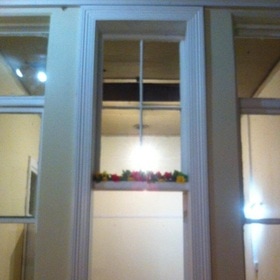 I N T E R V I E W Leafa Wilson of OLGA GALLERY By Elaine Gyde You’ve lived and been working creatively in Hamilton for a while, have you been able to find the answer to a question that occasionally tends to define the city: does Hamilton have a visual art scene? Kirikiriroa - Hamilton... does it have an art scene? Hell yes! This is one of the city's best kept secrets! There is a huge network of artists: loads of semi-professionals, amateur, Sunday painters, international artists, street artists, curators, art writers and dedicated scenesters for sure. Yes, there is an art scene. And where is the centre of that activity taking place? Well, there are so many places where art is taking place and being made. In artists' private studios, at art school (Media Arts - Wintec, at the University) there are regular exhibitions at The Calder and Lawson Galleries curated by Steph Chalmers, Curator of the University of Waikato Collections, there are shows at RAMP Gallery at Wintec, there are tons of 'fringe' art events, artists showing works in their homes such as the recent show at Karl Bayly's home, shows in empty shops, shows on the bus shelters by Jeremy Shirley, and other public spaces by artists like TechOne, shows at the new space in Frankton, Artmakers with Sylvie Bolstad and Teuila Fatupaito, there are is the WSA Art School and a gallery upstairs, also there is art in other forms happening all around the city such as the tattoo art that comes out of places like Flax Roots Tattoo Studio in Collingwood Street, there are artists making stuff out at Te Pahu with the McGillicuddies, there's are so many photographers and there is also art happening at student run spaces at the university as well, there's the Wananga o Aotearoa art schools where raranga (weaving, and carvining as well as 2D art is being made and there are loads of the older established artists such as Joan Fear, Gaye Fraundorfer, Ruth Davey, Colin Gibbs. There is also Aesthete Gallery, Soul Gallery, all of these place are devoted to promoting local, national and contemporary art the highest quality. Are the issues that impact local music, like accessibility and promotion, also problems for artists in Hamilton and how do you believe those problems could be solved? The issues surrounding local music are all due to lack of funds to provide venues that are able to continue and have some kind of foreseeable future. Promotion is one of the hugest costs because of the printing/ time spent on line that it takes to get promo material to the 'audiences' being sought after. Artists on the other hand, while audience is vital, they don't always care so much about drawing crowds so much as getting their work made and up for an audience that gives a damn about art. In saying that, every artist of any kind could probably do with some work being sold in order to continue their practice. Any city's artists and musicians are vital to creating a well-rounded society because often, their work brings about socio-political provocation that opens up conversations that often go unconsidered by many. Should audiences and community involvement even be a concern for the creative community, if great pieces are being created? Community is important, because everyone is community. Artists are part of that community but are often just overlooked and undervalued because they may not necessarily make art designed to hang on walls or that looks aesthetically pleasing. Sometimes their art is purposefully ugly... so for many artists, not all, there is a huge concern that their art is actually realised whether seen or unseen. I think there is a perception that all artists make art to sell at exorbitant prices, that's a different machine altogether from artists creating art. I think most artists would agree, that to sell a work of art is firstly, a bonus because somebody actually enjoys it and the monetary side is just an added bonus... on the other hand... the work that an artist invests via research, testing and making is worth every penny the buyer pays. (well... for the most part) I can give you a fair idea of when an artist overprices their work for no good reason except for the fact that they're living in la-la romantic artist land. What motivated you to open a bricks and mortar space of your very own, OLGA? OLGA is my own VA or space for me to test the boundaries of or curation+art rules+community. Also to enable artist's work that I really like or a political idea I would like to unearth or just to test what the spectrum of art might look like when I am my own boss. At the moment, I have been too busy to even get there to set up the next exhibition, but that's the part I love about it. It is holey space...there are gaps and there is nothing perfect or hugely expensive about it...artists (with close negotiation with me) show for free. I still have a particular standard. But it's also a space where I want to encourage people to meet and discuss all kinds of things. What does the day to day work of organizing OLGA look like? It basically looks like this [ ] and within that space... time and space is actually fluid. How has the experience of opening and operating your very own OLGA been and what have been the most interesting challenges about opening OLGA? I love OLGA ... she is a happy little space and she is not that concerned for art wankery. The challenge will always be, trying to NOT slip into conventions of 'gallery' just because of what other people expect. People who know me, know that this is the deal... the work is not meant to be like 'museum' or 'gallery' but they are in this space for a time... then their work will exist forever online on my site. http://olga-va.weebly.com/ I encourage anyone who is keen to submit works for online projects - it can be written or it can be sent as a scanned work ... the image must be accompanied by the details that the artist/ writer would like to be published, otherwise it will go up. I just don't have time to chase people's details. So if you are reading this and you have a work you'd like to test and submit, you'll have to send it (1 - 4 MB jpeg or png file) to [email protected] with your text (100 - 150 words but that's not compulsory) and also I also try to promote people of colour to show their works because there is an apparent gap for experimental spaces for people of colour. I don't care what language it's in either. I will post any works under the tab "Friends of OLGA' which doesn't mean I want to be pals and hang out, but friends with the space... or friends with the loose conceptual space that OLGA is. Has having the opportunity to independently run a physical space, impacted the way you create your own work? No, not really. I am primarily a multi-media performance-based artist. I make work... or I don't ... most of my work already exists in my noggin. The OLGA manifesto that features on your website is a beautiful reminder that often spaces in art (and the world) are taken up by the privileged or the highbrow, what do you think Hamilton Underground Press readers can do to help and advance that manifesto? I don't really think I want to illicit help or addition to the manifesto of OLGA as such. But I do want people to know, that art is not always about the panic that is evoked by the 'white cube' and openings and art speak. It's trying its best to be as open as is possible without collapsing and without killing me. Ultimately, it will close, I will move on and open OLGA elsewhere, even if that is just in my head, because OLGA is not really the building, but a manifestation, a performance work of mine. What is in store for OLGA in 2016? And are there any dream developments that you’d like to see happen? I have loose plans for showing some video-performances by USA artist, Christina McPhee, and performance artist Harpreet Singh of India / NZ. But also I am doing a FREE WEST PAPUA poster intervention in the space so people who care to raise the consciousness around the plight of the oppressed and brutalised West Papuans can all participate by sending in posters for me to install and to support the work of YOUNGSOLAWARA a young West Papuan Activist Group who are always trying to bring attention to their plea for freedom from the military regime decimating their population. Also, I want to bring a few pensioners up to teach them how to paint or to think about how to make a painting at the very least. Elaine Gyde 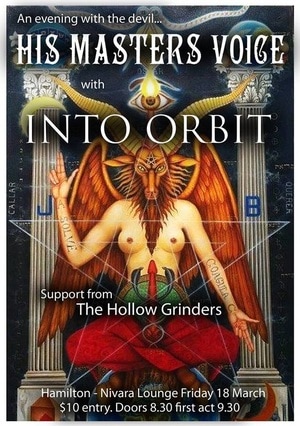 G I G R E V I E W The Hollow Grinders, Into Orbit, His Master’s Voice - Nivara Lounge, 18 March 2016 When the name of local surf guitar legends The Hollow Grinders appeared on a gig poster splayed across a phallus of a Baphomet or Sabbatic Goat, one had to ask, “Is the band taking a radical new direction?” “Would we be seeing the formal attire normally associated with these sharply dressed gentlemen ditched to be replaced by Rob Halford-inspired studded leathers or even the odd denim vest?” Fear not, there was no such change in direction for our trusty and reliable grinders. Their dalliance with metal rests in their name only. The Sabbatic Goat featured on the gig poster (an image created by French occult author Eliphas Levi) contains binary elements said to represent the "sum total of the universe" (e.g. male and female, good and evil, etc.). In musical terms the evening was comprised of extremely distinct acts delivering different genres. Not that there wasn’t any overlap between them. Performatively there were similarities between the two acts that book-ended the evening, while the middle act (Into Orbit) bridged the acts musically. The Hollow Grinders, as an opening act, worked well. Those familiar got off their feet to dance immediately while grinder-virgins found themselves powerless in the face of their spring-reverb washed twanging guitars causing heads to nod and feet to tap. A reliable source (Mr. Thrust) told me that this performance was preceded by only one practice. Nevertheless, the recently reunited band delivered a solid and tight set. The intensity of Dirk ‘Play Misty for Me’ Thrust’s drumming was a treat to watch, the switching of lead and rhythm between the guitarists gave the set a nice dynamic throughout. It was all over too quickly. When post-rock experimentalists Into Orbit took the stage not long after, the performative style switched quite dramatically. The Wellington duo, back in Hamilton again, delivered an impressive set in terms of work-rate. Using a looper to layer and build up each song, guitarist Paul Stewart played the role of several band members. Most of the songs in the set started in a melodic fashion, eventually building to heavier tones. There was a definitely a threshold that was reached by many of the songs which satisfied those there for headlining act His Master’s Voice. In tune with their post-rock influences the band didn’t offer a performance in the same way as the other acts, but moved assiduously between the many pedals laid out on the stage to create a sound bigger than a duo are expected to deliver. Final act of the night His Master’s Voice were unknown to your (clearly wet behind the ears) HUP reviewer, but clearly not to the many who turned out for the show. A healthy following turned up to enjoy their Devil’s Blues sound. Watching the band as they set up, their look was impressive, big hair, the return of the bandana, and some cool 70’s denim jeans on what turned out to be the front man Jesse Sorensen. The acts that preceded His Master’s Voice were both instrumental, so when Sorensen walked up to the mic and kicked off the gig with a powerful Plant-esque acapella vocal all immediately paid attention. Performance wise, they didn’t disappoint – n.b. there was even some excellent back-to-back guitar playing action witnessed. This is exactly what live gigs are about. Turning up and experiencing something outside your own personally imposed taste boundaries for 30 to 45 minutes and appreciating it for what it is. Celebrating diversity. Who wants to watch 3 identical acts? This way, everybody went home having experienced something a bit different. Gee Ttohcs G I G ( S ) R E V I E W birds of passage, The Unseen Mechanised Eye (Clarence Street) Hide & Tallow, Rumpus Room, Inchworm (Nivara Lounge) 11 March 2016 March 11 was a big night for music in Hamilton, with a Fringe Festival gig at Clarence St Theatre followed by the Inchworm reunion at Nivara Lounge. First up at Clarence Street were Birds of Passage. Over 60 were in attendance, ranging from the young to the old, and included a disproportionately high number of beards. With the audience sitting on the darkened Clarence St Theatre stage, rather than in the main theatre seating area, the two-piece performance featuring Alicia Merz (keyboards and occasional guitar) with Gareth Schott (guitar) played their ambient minimalist compositions with a backdrop of interesting visuals projected on a big screen. Overall, the seating placement, music and accompanying visuals made for an intimate experience, which the audience greatly appreciated. Next up were ‘The Unseen Mechanised Eye’, whose “minimal, droning avant-classical soundscapes” were based primarily around Rob Thorne’s traditional Māori instruments (taonga puoro). Their performance was both interesting and varied, although with the show unfortunately running later than expected, I needed to leave them early for my second port-of-call, Nivara Lounge. 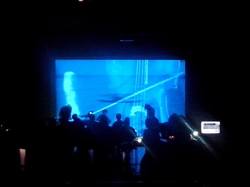 There was quite a different audience attending the Inchworm gig, with most around the 40 years-of-age mark, and with most being distinctly less hirsute. Overall, the atmosphere of the gig was a bit like a school reunion – a nostalgic trip down memory lane, which included all the excitement and anxiety involved with seeing people again you haven’t seen for years. Support acts Hide & Tallow and Rumpus Room didn’t get the level of attention they deserved, unfortunately, although a surprise cover of Garageland’s ‘Nude Star’ by Rumpus Room certainly ripped many people’s attention away from whoever they were talking to a time. Ultimately, however, the night was all about Inchworm. Their performance began with the wonderful ‘You Get to Me’ off their final ‘You are Only Here’ album. Although this included a couple of false starts, the band soon hit its straps and provided a thoroughly entertaining show. Many of the full house who attended danced and sang away to all of the familiar songs that were still firmly burnt into their collective minds. The band avoided their set being a complete nostalgia-fest, however, by adding a couple of brand new songs, ‘Three Islands’ and ‘Strider Rider’, of which recordings should see the light of day (along with several others) sometime in the future. Overall, the songs from their final album best passed the test of time, and provided an indication of what might have been had they managed to stay together just a few more years. Following one of their strongest songs, ‘The End’, the show was over, and everyone seemed to go home happy. 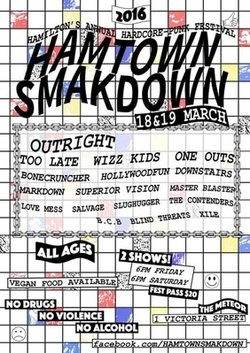 P R E V I E W Hardcore with open arms: A chat with Hamtown Smakdown organiser, Sam Chumz By Hp I get lost. I am neither proud nor pleased that this is the case, but Sam Chumz, Hamilton musician and general music guy doesn't make me feel bad about it. He waves off my apologies and we take up residence in what I am certain is a cafe on the brink of closing for the day. So as waiters mop floors and balance tills, I try to unravel the annual punk and hardcore show Hamtown Smakdown just before it launches it's 16th event over the weekend of the 18th and 19th of March. Sam Chumz is all of 27, but he is an old hand in Hamilton. He has played in scores of bands, including current hardcore heroes Wizz Kids, and new venture, Love Mess. In 2009 he picked himself out of the muck of the legendary house-party-come-concert venue, The Palace, and went on to open Void at the north end of Vic Street. Void became like a home to so many of Hamilton's musically enthralled punters and an actual home for many others staying upstairs one too many nights to be called guests and one too few to pay proper rent. Chumz and his bevy of collaborators dedicated the space to a wide array of musical tastes for all ages, though primarily punk and hardcore permeated the air. The stairs leading up into the venue read proudly, "No Racism, No Sexism, No Homophobia, No Violence, No Alcohol, No Drugs," which was always intended to promote inclusiveness. That is what Chumz is trying to replicate with Hamtown Smakdown again this year, a space of inclusiveness where those interested in music rather than the drugs, alcohol or the violence can come and enjoy an evening or two out. I ask Chumz about violence, but in no way because he looks like a violent person. He's thin and speaks both quietly and with a hurried confidence. Not only does he seem non-violent, I learn he's vegan and a cyclist. However, hardcore punk has been linked to violence both in its inception in the late 1970s and early 1980s in Washington DC and LA and, I learn from Chumz, more recently in Hamilton at previous Hamtown Smakdown events and similar shows. Chumz' attitude to how violence and hardcore mix is not all that different from the likes of hardcore bands in those earlier times. When Black Flag guitarist, Chuck Dukowski was asked about his audience he explained, "[the audience] go there for the intensity of the event...the action at the event is very violent". So it was in Hamilton, where Chumz saw some of the most extreme hardcore dancing anywhere. But it wasn't long before Smakdown started seeing what the likes of Black Flag had seen; people attending the events as an excuse to get violent. That is what Chumz is trying to avoid. It was in the values of Void and has been at the forefront of the last three Smakdown events of which he has been at the helm. He sees diversity in the crowd as key to supporting this culture and to get diversity in the crowd, he has been looking for diversity in the bands. Melbourne hardcore band Outright are one way to move things and their incredibly upbeat front-woman, Jelena Goluza will ensure smiles on every face as they headline this years' Smakdown. It was important to Chumz to see more female attendees at the show and as a friend of Outright's Goluza, he knew they were exactly the right spirit to bring over. Chumz acknowledged that the crowd has been male-dominated in the past and even had a "jock" type feel, but he is making sure that those from every walk of life can climb the Meteor steps on the weekend and open their ears to two nights of blistering music with nothing to worry about and a positive atmosphere. In fact, it's not just a hardcore scene or walking musical encyclopaedias that Chumz is trying to attract either. He's hoping it will be the first show attended by many. An introduction if you will. Partly because he remembers coming into Hamilton for some of his first shows and the affect it had on him and partly because he is quietly proud of the event, the music and the place he's had in it all this time. 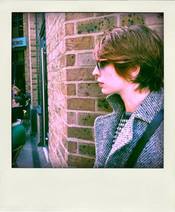 I N T E R V I E W birds of passage By Arpie Shirehorse HUP caught up with Alicia Merz a.k.a. birds of passage ahead of their show at Clarence Street Theatre this coming Friday. Alicia gives fascinating insights into where birds of passage delicate music comes from and also looks forward to playing the Further Future festival in Las Vegas alongside the likes of Four Tet, Caribou and Leftfield. Please tell us how birds of passage came to be - what made you start to write songs and record albums? Had you been in bands before birds of passage? In my teens and after, I wrote a lot of poetry….. and I found it hard to find music that I liked to listen to because what was available was limited as the internet at first wasn’t there and then was only just sort of starting, I didn’t have access to really anything outside of what was really popular etc. which I wasn’t connecting to.. I started writing my own songs at first just for myself because it was feeding some sort of musical need in me that I didn’t seem to be able to find anywhere at the time. So I wrote songs using a piano and guitar, and then one day when I was about 16 or 17 I rented some equipment, like a mic and a synth, and recorded a few of them on a weekend. That was the first time I recorded anything and from there I started to get my own sort of stuff together so I didn’t need to hire things and could create a sound closer to what I was wanting. after a few years (maybe 6), my husband at the time convinced me to put some of the songs up on Myspace and I then discovered a whole world of people making music coming from a similar place as mine, and who actually liked what I was doing and I was really surprised, even more surprised when I was asked to join a label in the U.S. and through them the label I’m on now (Denovali records) heard my stuff and invited me to join, and so that’s how the albums came about. And I’m still surprised. Your music is extremely fragile and very evocative. Is there a particular mood or frame of mind that you find more conducive to writing, or do songs just come to you from nowhere? Or both? Sometimes a song comes from nowhere, but more often there is some sort of trigger…it’s often the seasons which conjure up feelings, memories etc., often it’s an experience...vast spaces…sometimes it’s just things I’ve been thinking about… often love, wild love, quiet love, unrequited love, highwaymen… people I know become characters. Lots of songs are about people I’ve met, maybe conjured up some stories about them… How does the recording process work for you - do you hole up in a studio for days/weeks or is it more fractured than that, perhaps some home recording in there somewhere? Actually all of it is home recorded, and I hole up in the sense that every night I’ll be up pretty much all night… the days are out as I have two young boys...I remember nights working on recording, mixing, etc., with baby at my breast…Lady Madonna.... You are shortly jetting off overseas to play some fairly big festivals - what can you tell us about that? Are there any favourite bands playing that you’re looking forward to seeing live?
The festival I’m playing at, with Gareth Schott (sink\sink, Ancient Tapes) - who very kindly and patiently learnt all the songs and agreed to come along to add his sound, which makes everything so much better - is called Further Future, it's similar to Burning Man, and it’s held annually in the Nevada desert. It’s predominantly a music festival where "each artist is deliberately chosen to transcend genre, trends, and time." As well as music acts there will be speakers and wellness programs. Further Future's founder Robert Scott said this about it: A Further Future event aspires to be a gathering of people with the common goal to spend time together celebrating the infinite possibilities of the future, without necessarily being shackled to the dictates of the past or the cycles of present-day society. We want to combine the connective power of music and art to bring people together in a place where they can shed their anxieties and fears, and touch a natural state of happiness.” I just also want to say how lucky I feel that I crossed paths with Gareth Schott...I don’t think its common, especially in these parts, to find someone willing to play such minimalist (and amazing) stuff on their guitar, and so willing to accommodate someone else’s music. I’m really grateful to him and what he has brought to birds of passage live. I’m particularly looking forward to seeing Hauschka, Still corners, Pedro Aguiar, and Elderbrook perform live, and there are some interesting talks and other things on as well. Have you found being based in Hamilton has helped or hindered you in any way? Along with so many other experiences in life, the experience of growing up in Hamilton, New Zealand, has a big effect on the music I make, its sound, content, atmosphere; helping and hindering in different ways. What can we expect at the show on Friday - will it be a warm up of sorts for the overseas shows involving the same songs? Yes, the songs we’ll be doing are some of those we will be doing at the festival. I generally try not to perform in front of people, id rather be hiding somewhere, but this gig at the Clarence Street Theatre will be a really good experience, I’m looking forward to it :) my music is mostly about atmosphere…and minimalism I feel makes it more possible to touch with the essence of a song…so maybe expect something like that. Some quick-fire questions...If you could curate a gig anywhere in the world with three bands of your choice, who would play and where would it be held? I wouldn’t mind where, but Nina Simone, Nick Drake and Leonard Cohen would be who I would choose :) What is the most rock and roll thing birds of passage has done? I think I probably shouldn’t disclose it if there was one….. :) Kim Deal or Kim Gordon? Kim Gordon Courtney Barnett or Courtney Love? Courtney Barnett Auckland or Wellington? Wellington birds of passage play Clarence Street Theatre this coming Friday, March 11th, with The Unseen Mechanised Eye, as part of the Hamilton Fringe. Doors are at 7.30pm, $10 entry, $5 concessions. |
Archives
July 2022
Categories |
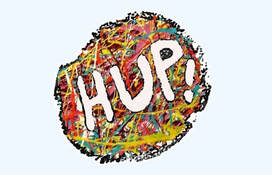
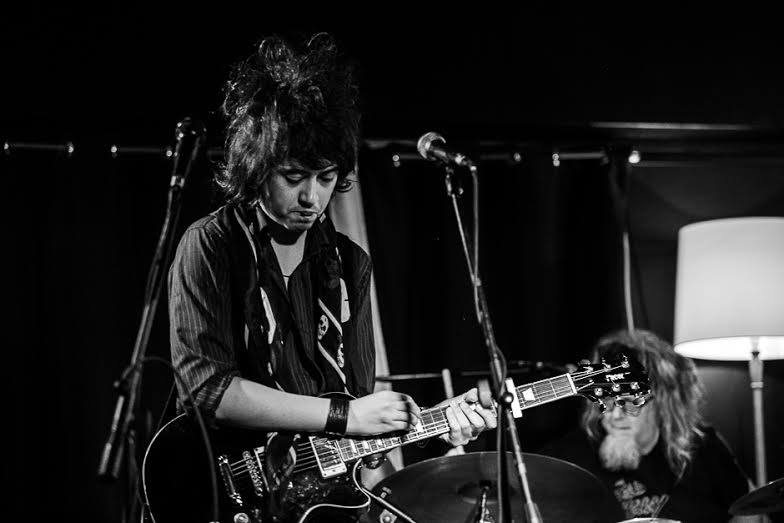
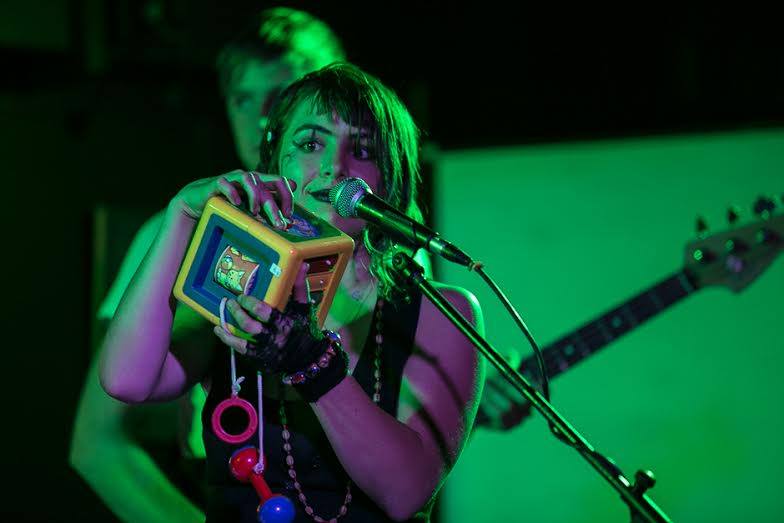
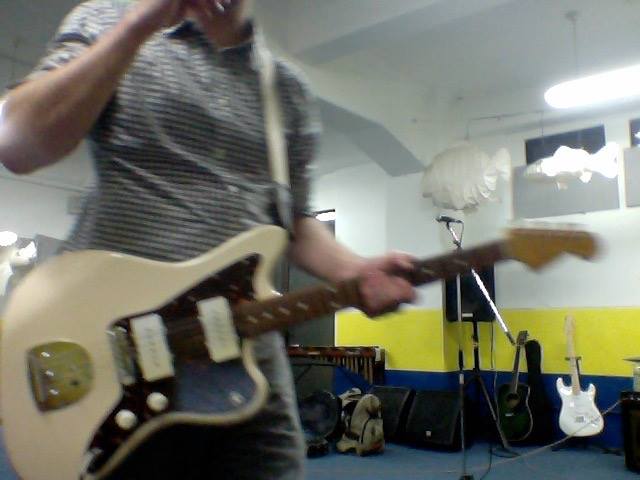
 RSS Feed
RSS Feed
